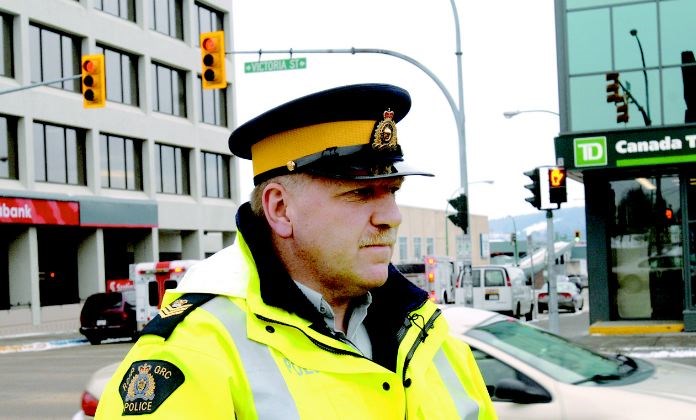A new message is being heard on answering machines since the latest driving laws were introduced this fall. Prince George research by ICBC showed that the message is being heard by local drivers. It goes something like this:
"I'm sorry I can't take your call right now. I might be away from my desk or behind my wheel, but I'll return your call as soon as possible. Thank you for calling."
And, said officials from ICBC and the RCMP, thank you for not answering in those instances when you're driving. When the phone rings and you're away from your desk, no action is required, but when someone is driving it takes a conscious choice to turn it off or let it ring out.
"I even catch myself reaching for the cell phone as I drive sometimes," said RCMP Sgt. Al Steinhauser, commander of the city's traffic unit. He understands there is a paradigm shift going on among drivers, but he has trained himself to let it go since research is now indisputable.
Studies have shown that talking on a conventional cell phone while driving renders the motorist's reaction time and decision making just as impaired as illegal alcohol limits. Thus the B.C. government passed a law in October banning the use of electronic devices (cell phones, text message machines, game units, iPods, laptops, etc.) while driving.
Diana Pozer, ICBC's regional road-safety co-ordinator, followed that up with some simple research of her own. One week ago, Pozer stood at the corner of Victoria Street and 4th Avenue and observed the drivers at that busy downtown intersection. She counted 350 in her time there, and only two drivers were talking unlawfully on a cell phone.
"That is very encouraging; that was great news for us," Pozer said. "Driving is a very complex task. You have to make sure you are really focused on the road."
Since the law was enacted, an education period followed. Drivers caught by police in the act of breaking the motorist cell phone ban were given warnings. In a few days, that grace period ends.
"I get to write tickets on Monday," said Steinhauser, in mock glee. Like Pozer, he said he was pleased with the tiny infraction rate seen during the survey and did not feel many fines would need to be levied.
"People really seem to be getting the message about this," he said. "When people get careless are times like the morning when you're multitasking, getting the kids to school and trying to get some work stuff done before you get there, arranging your day a bit, and you go to the phone when you really shouldn't."
Pozer said the tips to stay legal - and keep the public safe from your impaired driving - are to simply ignore the phone when it rings, or have a passenger answer, pull over and stop if you simply must answer the call, or use a hands-free device.
Penalties, depending on the situation, can cost you a $167 fine, points on your license, a discretionary driving suspension by the superintendent of motor vehicles, delays in getting your full license if you are still part of the graduated licensing program, etc.



